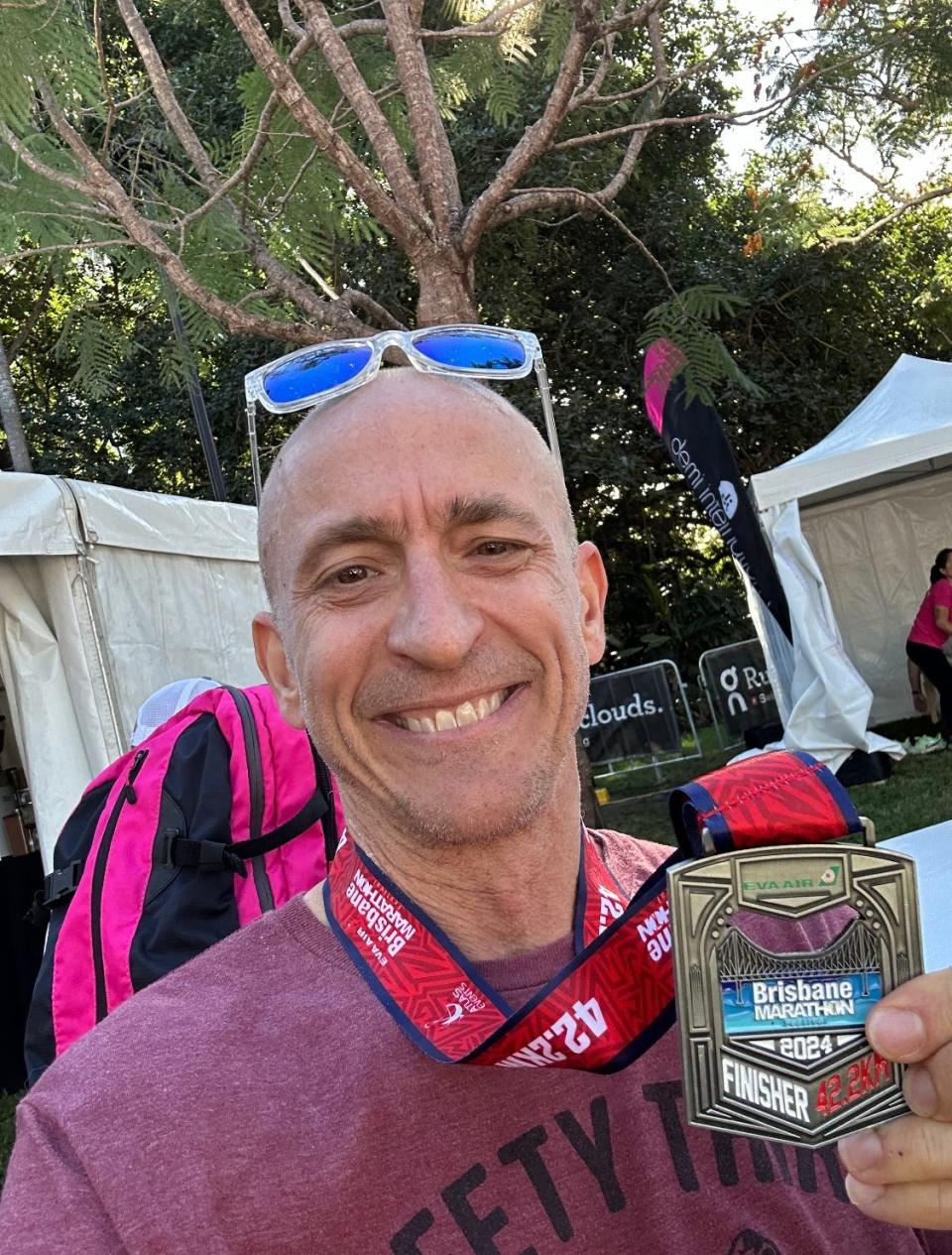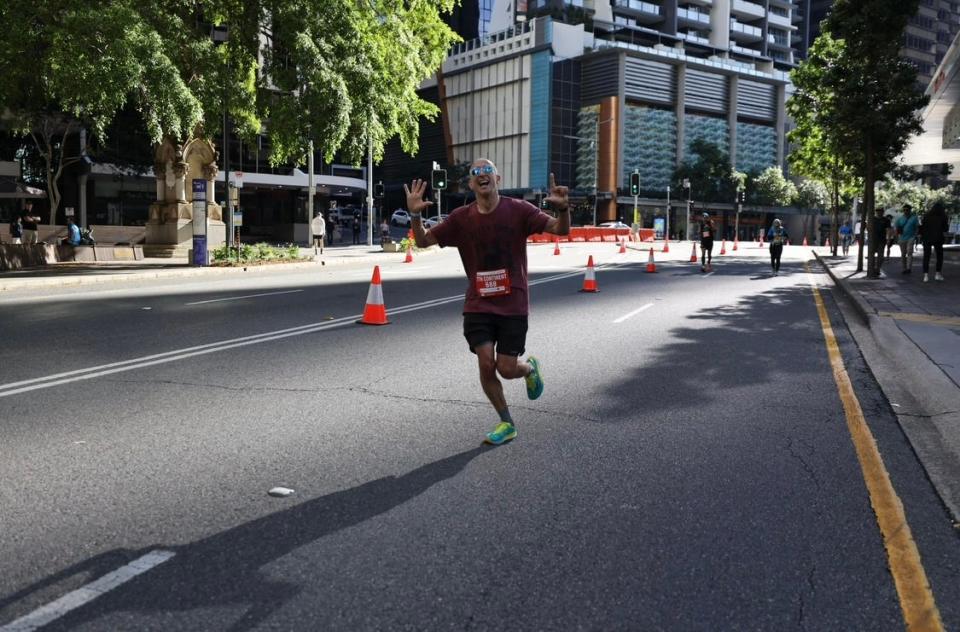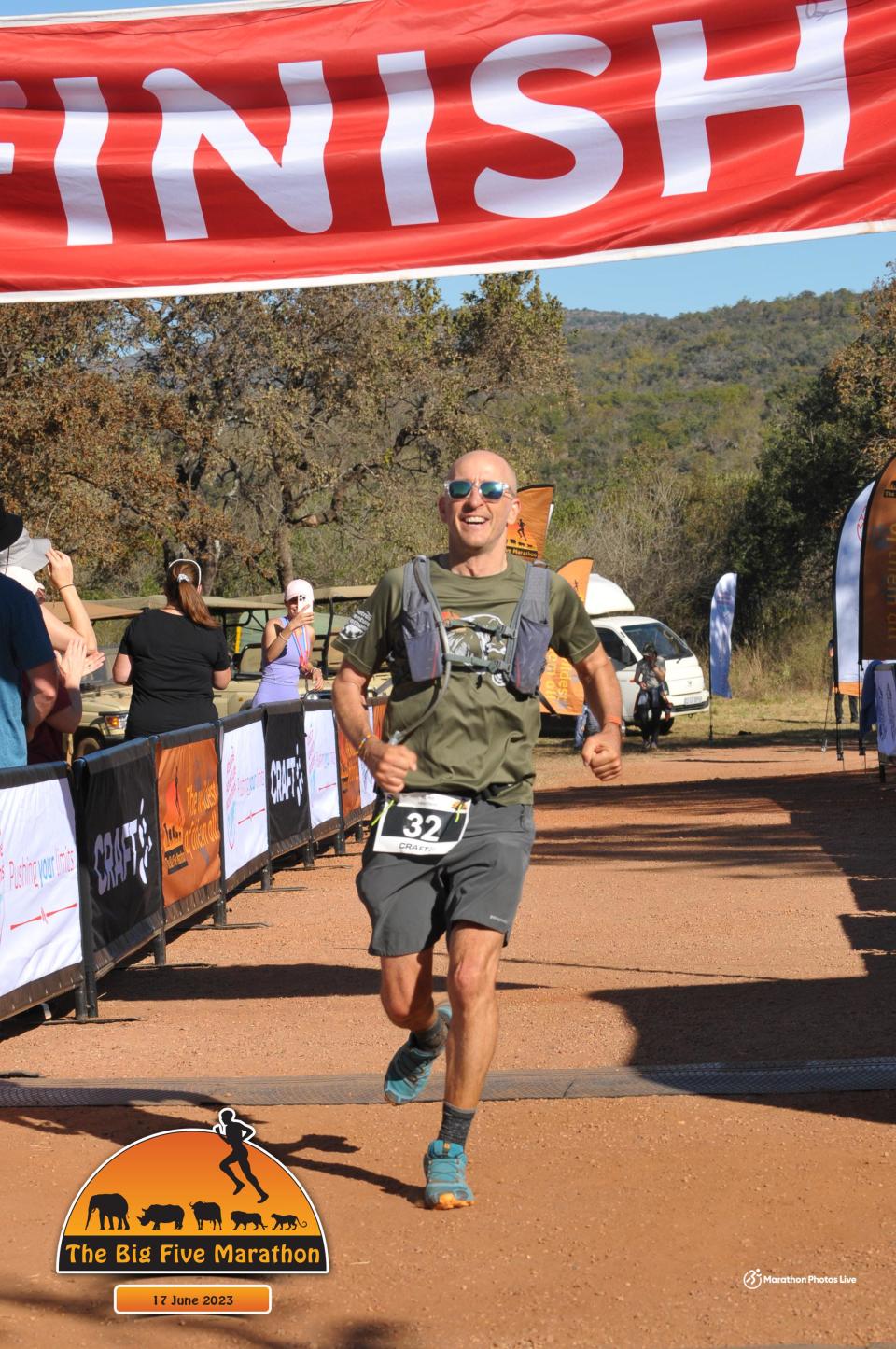An MS diagnosis 'scared' him to get more active. Now he's done marathons on all 7 continents.
Derek Stefureac was 39 years old when he was diagnosed with multiple sclerosis, a neurological disease that makes it difficult to walk, see and think clearly.
Now, at 52, the Las Vegas man has reached an ambitious goal to get healthier and run a marathon on each continent. He started in early 2022 and got the idea after meeting other runners in Antarctica who had set out to do the same thing.
His last race was the Brisbane Marathon on June 2 in Australia, completing the race with a friend he met last year at the Mount Everest marathon, he told USA TODAY Tuesday afternoon.
“It went great,” he said, adding that his finishing time was three hours and 30 minutes.
“My second best time in a marathon out of the 36 that I've done. It was a nice course. Beautiful weather down there. Little bit humid. I'm not used to that being from Las Vegas. But all in all, a really good run.”
His MS diagnosis pushed him to run more after doctors said he may lose his ability to run, he told USA TODAY. But that just made him want it more, he said.
“Before my diagnosis, I had no desire to run marathons and now it's like my favorite thing to do,” he said.
Pre-MS, Stefureac spent a great deal of his life smoking cigarettes and he didn’t work out much. After his diagnosis, he knew he needed to get in shape and live a healthier lifestyle, he told USA TODAY.

Journey to race on each continent took slow but steady progress
After he was diagnosed, Stefureac started jogging more. He noticed after a mile or so, his left leg would drag behind him.
“That kind of motivated me to run more because it kind of scared me,” he said. “The same thing with quitting smoking.”
By 2014, he realized he could run longer without his leg dragging behind him. He kept running and signed up for a half marathon a few years later, but had to stop and walk about 10 miles in. In another race, he began limping around mile 11 or 12 and his foot began to drag.
“By dragging my foot behind me just to finish, I put a big hole in my shoe,” he said.
Still, he kept running and heard murmurs of worldwide races, including one in Antarctica. He gave it a shot and that’s where he met people who set out to run marathons on each continent.
“After a couple of months and having such a great experience there, I just thought ‘Why not go for it now?’” he said.
Eyes on the Boston Marathon
In addition to racing on each continent, Stefureac set out to qualify for the Boston Marathon.
It helped that he met people who had come close to qualifying for the Olympics. They told him about their training regiments.

“I took four months and did a hardcore training regimen and ended up qualifying for the Boston Marathon in April,” he said, adding that he tried to qualify for seven years.
To train for his races over the past few years, he worked with a coach for a few months and followed a “regimented training plan of running every day” at different miles and speeds, he said.
He feels competing in races the way he does is “keeping the MS at bay,” at least partially.
Of the races he has competed in, one of the most difficult was at Mount Everest. Before running, he had to make a two-week hike up to base camp and spent two nights there. He lost sleep one night due to altitude sickness.
It was the hardest but the most rewarding, he said.
He used to run alone but now he runs with a group, which has been great. He loves meeting other runners.
"There's a Las Vegas marathon coming up later this year," he said. "When I run it, I'll probably know 50 people running it and that'll be a pretty fun thing to be a part of."
Stefureac said he doesn’t hide his diagnosis but most people don’t know he has MS.
In addition to making him live a healthier lifestyle, the disease also pushed him to overcome his fear of needles. He started medication right after his diagnosis but he has to self-inject it three days a week.
“I actually considered not going on treatment because it was only injectable,” he said. “Sometimes it took me like an hour-and-a-half to self-inject because I'd be all sweaty, nervous, and I’d just put the thing down and walk around the table, take a drink of water.”
He’s happy to be symptom-free, he told USA TODAY Tuesday afternoon.
“I feel healthier than I've ever felt,” he said.

Runner was working his office job when he experienced a ‘bizarre attack’
Calling his initial health issue in 2011 a “really bizarre attack,” Stefureac was working his office job when his body went “totally rigid” for about 30 seconds to a minute.
“The numbness went up my leg and my knee, and then up to my hip,” he told USA TODAY, adding that he initially thought he was having a stroke.
He saw doctors and after about three months, he was diagnosed with multiple sclerosis, also known as MS.
MS isn't always debilitating: 'You can pursue dreams. You can pursue competitions.'
MS is an autoimmune disease where immune cells attack the lining of the nerves, said neurologist Dr. Le Hua, who treats him at the Cleveland Clinic Lou Ruvo Center for Brain Health in Las Vegas.
She said many of her patients who have MS are not disabled and live their lives normally.
“MS can be disabling (but) if you are on treatment early, if you do some of the lifestyle changes, it doesn’t have to be any disease that interferes with your normal life,” she told USA TODAY on Tuesday. “You can pursue dreams. You can pursue competitions.”
She said there is a myth about MS that exercising makes the disease worse. Some people think that as body heat increases, the nervous system won’t communicate as well. Because of this belief, some people think MS patients shouldn’t work out.
But it’s just not true, Hua said. In fact, working out can improve their lifestyles by allowing them to function better, feel better and reducing some of their symptoms such as pain and fatigue.
A healthy diet is also important, she said. She encourages people with MS to try a Mediterranean diet that has a lot of fruits and vegetables, as well as foods with reduced saturated fats, reduced sugars and more natural, whole grains. She also said antiinflammatory meats, fish and poultry are good options.
Lastly, she said quitting smoking is critical.
“Smoking, unfortunately, has been associated with worsening disability and MS,” she said, adding that Stefureac benefited from early diagnosis and early treatment.
Stefureac said he doesn’t think about his diagnosis much other than when he takes his meds and refills prescriptions. It hasn’t stopped him.
His health and success at running on each continent is a testament to the importance of perseverance, a positive attitude, and following doctor’s orders, he said.
Now that he’s done, there are more races in store for him. In August, he’ll go to the North Pole to race.

It’s vital to stay encouraged and keep at it to build confidence, he noted.
“Everyone is capable of more than you think you are,” he said.
Saleen Martin is a reporter on USA TODAY's NOW team. She is from Norfolk, Virginia – the 757. Follow her on Twitter at @SaleenMartin or email her at sdmartin@usatoday.com.
This article originally appeared on USA TODAY: Man with multiple sclerosis races in marathons on all 7 continents


